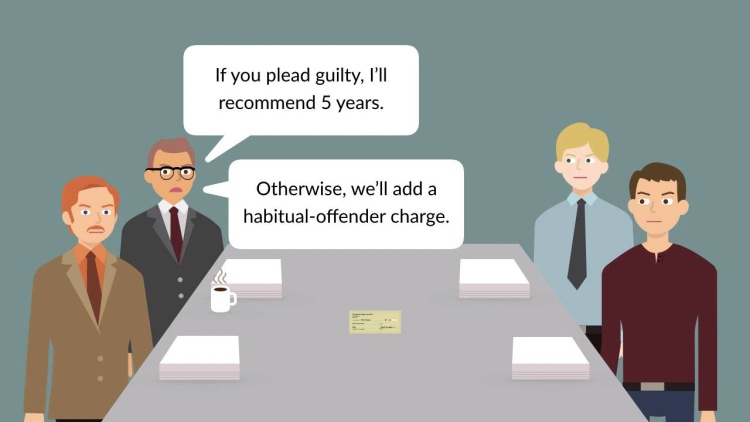Bordenkircher v. Hayes
United States Supreme Court
434 U.S. 357, 98 S. Ct. 663, 54 L. Ed. 2d 604 (1978)
- Written by Sarah Venti, JD
Facts
Paul Lewis Hayes (defendant) was indicted on a charge of uttering a forged instrument in the amount of $88.30, punishable by up to 10 years’ imprisonment. Thereafter, Hayes and his attorney met with the prosecutor to discuss a possible plea agreement. The prosecutor offered Hayes a sentence of five years in prison if he pled guilty to the uttering charge and “saved the court the inconvenience and necessity of a trial.” However, if Hayes chose not to plead guilty, the prosecutor would go back to the grand jury and reindict Hayes as a habitual offender, subjecting him to a possible mandatory term of life imprisonment due to Hayes’s two previous felony convictions. Hayes chose not to plead guilty, and the prosecutor obtained an indictment charging him under the state’s Habitual Criminal Act. Hayes was subsequently found guilty of the uttering offense and sentenced to life imprisonment. The Kentucky Court of Appeals affirmed the sentence. Hayes then filed a petition for a federal writ of habeas corpus. The court of appeals held that the prosecutor’s conduct during the plea negotiations had violated the principles that “protected defendants from the vindictive exercise of a prosecutor’s discretion” and ordered Hayes’s sentence to be reduced to a lawful sentence imposed only for the uttering crime. The United States Supreme Court granted certiorari to review.
Rule of Law
Issue
Holding and Reasoning (Stewart, J.)
Dissent (Blackmun, J.)
Dissent (Powell, J.)
What to do next…
Here's why 907,000 law students have relied on our case briefs:
- Written by law professors and practitioners, not other law students. 47,100 briefs, keyed to 996 casebooks. Top-notch customer support.
- The right amount of information, includes the facts, issues, rule of law, holding and reasoning, and any concurrences and dissents.
- Access in your classes, works on your mobile and tablet. Massive library of related video lessons and high quality multiple-choice questions.
- Easy to use, uniform format for every case brief. Written in plain English, not in legalese. Our briefs summarize and simplify; they don’t just repeat the court’s language.





